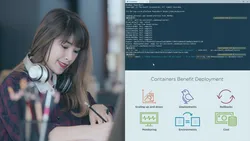
Getting Started with Docker Swarm Mode 
This course will teach how to use Docker Swarm Mode to control a cluster of nodes with the same ease as managing a single Docker engine. Learn how to take advantage of the power of a cluster with the simplicity of a single node. ▼
ADVERTISEMENT
Course Feature
![]() Cost:
Cost:
Paid
![]() Provider:
Provider:
Pluralsight
![]() Certificate:
Certificate:
No Information
![]() Language:
Language:
English
Course Overview
❗The content presented here is sourced directly from Pluralsight platform. For comprehensive course details, including enrollment information, simply click on the 'Go to class' link on our website.
Updated in [March 06th, 2023]
This course provides an introduction to Docker Swarm Mode, a powerful tool for managing a cluster of nodes as easily as a single node. Students will learn how to create a swarm, add nodes, and launch services that describe containers. The course will also cover how to route traffic to and within the cluster, as well as how to ensure containers recover from failures. Additionally, students will learn how to deploy multi-application stacks and roll out updates. The course will also cover how to use integrated health checking and use secrets to protect sensitive information. By the end of this course, students will have the knowledge to deploy their own swarm.
[Applications]
After completing this course, learners can apply their knowledge of Docker Swarm Mode to manage a cluster of nodes as easily as a single node. Learners can use the skills they have acquired to create a swarm, add nodes, and launch services that describe containers. They can also use their knowledge to route traffic to and within the cluster, as well as ensure containers recover from failures. Additionally, learners can use their skills to deploy multi-application stacks and roll out updates, as well as use integrated health checking and secrets to protect sensitive information.
[Career Paths]
1. DevOps Engineer: DevOps Engineers are responsible for managing the development, testing, and deployment of applications and services. They are also responsible for ensuring that the applications and services are running smoothly and efficiently. As the demand for cloud-based services increases, DevOps Engineers are becoming increasingly important in the IT industry. They must be knowledgeable in both software development and system administration, and must be able to work with both teams to ensure that applications and services are running smoothly.
2. Cloud Architect: Cloud Architects are responsible for designing and implementing cloud-based solutions. They must be knowledgeable in cloud computing technologies, such as virtualization, storage, networking, and security. They must also be able to design and implement solutions that are cost-effective and secure. As cloud computing continues to grow in popularity, Cloud Architects are becoming increasingly important in the IT industry.
3. Container Engineer: Container Engineers are responsible for managing and deploying containerized applications and services. They must be knowledgeable in container technologies, such as Docker, Kubernetes, and Swarm. They must also be able to design and implement solutions that are secure and efficient. As container technologies become more popular, Container Engineers are becoming increasingly important in the IT industry.
4. Data Scientist: Data Scientists are responsible for analyzing and interpreting large amounts of data. They must be knowledgeable in data analysis, machine learning, and artificial intelligence. They must also be able to design and implement solutions that are accurate and efficient. As data becomes more important in the IT industry, Data Scientists are becoming increasingly important.
[Education Paths]
1. Bachelor's Degree in Computer Science: A Bachelor's Degree in Computer Science is a great way to gain the skills and knowledge needed to work with Docker Swarm Mode. This degree will provide students with a comprehensive understanding of computer science fundamentals, such as algorithms, data structures, and programming languages. Additionally, students will learn about operating systems, computer networks, and software engineering. With this degree, students will be able to develop the skills needed to work with Docker Swarm Mode and other related technologies.
2. Master's Degree in Cloud Computing: A Master's Degree in Cloud Computing is a great way to gain the skills and knowledge needed to work with Docker Swarm Mode. This degree will provide students with a comprehensive understanding of cloud computing fundamentals, such as cloud architecture, cloud security, and cloud storage. Additionally, students will learn about cloud computing platforms, cloud computing services, and cloud computing applications. With this degree, students will be able to develop the skills needed to work with Docker Swarm Mode and other related technologies.
3. Certificate in Docker Swarm Mode: A Certificate in Docker Swarm Mode is a great way to gain the skills and knowledge needed to work with Docker Swarm Mode. This certificate will provide students with a comprehensive understanding of Docker Swarm Mode fundamentals, such as creating a swarm, adding nodes, and launching services. Additionally, students will learn about routing traffic, ensuring containers recover from failures, and deploying multi-application stacks. With this certificate, students will be able to develop the skills needed to work with Docker Swarm Mode and other related technologies.
4. Master's Degree in Artificial Intelligence: A Master's Degree in Artificial Intelligence is a great way to gain the skills and knowledge needed to work with Docker Swarm Mode. This degree will provide students with a comprehensive understanding of artificial intelligence fundamentals, such as machine learning, natural language processing, and computer vision. Additionally, students will learn about robotics, autonomous systems, and deep learning. With this degree, students will be able to develop the skills needed to work with Docker Swarm Mode and other related technologies.
The development trends for these degree paths are focused on the increasing demand for professionals with the skills and knowledge to work with Docker Swarm Mode and other related technologies. As the demand for these professionals increases, more universities and colleges are offering degree programs and certificates in these areas. Additionally, the development of new technologies, such as artificial intelligence, is driving the need for professionals with the skills and knowledge to work with Docker Swarm Mode and other related technologies.
Course Syllabus
The Magic of Docker Should Work on Multiple Machines Too
What Are Some of the Concerns When Moving to Multiple Machines?
What You Should Already Know
What if a Single Container Isn't Enough?
Scaling Capacity by Scaling Containers
What About Balancing Load Across Containers on Different Nodes?
What Happens When a Container Fails?
What Happens When a Node Fails?
What About Internal Communication?
User Defined Networks to Connect Containers on a Single Node
docker-compose Simplifies Complex Containers and Networking
What About Scaling Internal Application Dependencies?
Course Provider

Provider Pluralsight's Stats at AZClass
Pluralsight ranked 16th on the Best Medium Workplaces List.
Pluralsight ranked 20th on the Forbes Cloud 100 list of the top 100 private cloud companies in the world.
Pluralsight Ranked on the Best Workplaces for Women List for the second consecutive year.
AZ Class hope that this paid Pluralsight course can help your Docker skills no matter in career or in further education. Even if you are only slightly interested, you can take Getting Started with Docker Swarm Mode course with confidence!
Discussion and Reviews
0.0 (Based on 0 reviews)
Explore Similar Online Courses

Data Science and Agile Systems for Product Management

CakePHP 3 Tutorial with User Authentication and Admin

Python for Informatics: Exploring Information

Social Network Analysis

Introduction to Systematic Review and Meta-Analysis

The Analytics Edge

DCO042 - Python For Informatics

Causal Diagrams: Draw Your Assumptions Before Your Conclusions

Whole genome sequencing of bacterial genomes - tools and applications

Managing Docker on Linux Servers

Fundamentals of Docker and Kubernetes for NET Developers

WSL 2 Docker Kali Linux and Windows Terminal - get started
 Related Categories
Related Categories
 Popular Providers
Popular Providers
Quiz
 Submitted Sucessfully
Submitted Sucessfully
1. What is the main purpose of this course?
2. What will you be able to do by the end of this course?
3. What is one way to protect sensitive information?
4. What is Docker Swarm Mode?
Correct Answer: It is a clustering and scheduling tool for Docker containers.


Start your review of Getting Started with Docker Swarm Mode